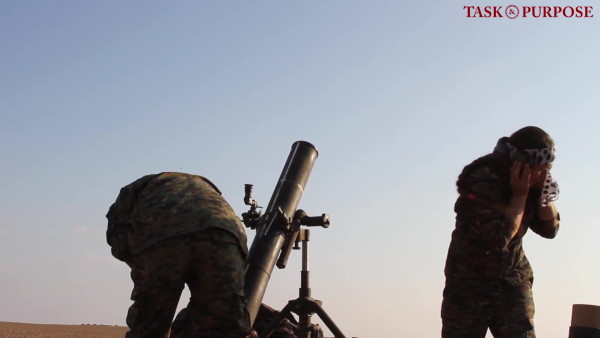

[shortcode-Op-Ed-disclosure]
Trump’s recent decisions in northern Syria were ill-advised, strategically unsound, and morally shameful. In rapidly withdrawing U.S. presence and allowing a Turk offensive into Syria, we have left the Syrian Kurds behind, created a power vacuum for our adversaries to fill, and set the stage for the resurgence of ISIS.
Trump gave many justifications for his decisions. That we’ve given the Syrian Kurds “a lot of money and equipment,” that the Kurds were “already in the region” before we entered Syria, and that “fighting between various groups…has been going on for hundreds of years.” In a recent interview, he cited that Turkey’s President Erdogan was “going to go in anyway. They’ve been fighting the Kurds for 200 years.”
As if any of this absolves our duty to our partners the Kurds. From a warrior’s perspective—it does not. Perhaps more importantly, from a human perspective it does not.
In giving a nod to Turkish forces to enter Syrian Kurd-held territory unchecked and wage a campaign against our partners the Syrian Democratic Forces (SDF) who the Turks have long held as their enemy, we threw our partner forces completely to the wolves. We forfeited American honor in leaving behind some of our strongest partners in the fight against ISIS—partners who fought and bled to help defeat our common enemy, and lost around 11,000 in the fighting over the past five years.
We’ve seen this movie before. We remember, in 2014, when a small group of us went into Iraq to stop this new terrorist army called ISIS from rampaging across northeast Syria and northern Iraq. Voices back home blamed President Obama’s expedited withdrawal a few years earlier for the formation of ISIS. We would be wise to remember that now, as ISIS’ presence throughout Syria remains by way of massively proliferated splinter cells.
And we remember, in 2015, when the Russians entered Syria and began their own bombing campaign against ISIS in the midst of ours, many back home lambasting our efforts in Syria as weak. Then Trump even declared that the Russians were “taking over what we started.” If it wasn’t true back then, it surely is now — but in an even bigger way.
Indeed, we can see this pattern playing out with Turkey. While our NATO ally has unofficially been a part of our anti-ISIS coalition, at the same time they were targeting ISIS with airstrikes, they also targeted Kurdish forces in northern Iraq and northern Syria whenever they could get away with it. And we’ve known it: from President Obama to President Trump, we have been willing to overlook the fact that Turkey has targeted our own partners in the fight against ISIS.
When Trump stoked bipartisan ire with his withdrawal announcement, he responded by stating he would “obliterate” Turkey’s economy if they attacked the Syrian Kurds. But that statement was a red flag of inconsistencies: we’ve relied heavily on our NATO ally, using Turkey’s Incirlik and Diyarbakir air bases for forward-staging of aircraft and drones and Turkish airspace for transit of aircraft in and out of theaters of operations, and Trump’s first round of retaliatory sanctions have proven fruitless.
A Turkish miltary convoy is pictured in Kilis near the Turkish-Syrian border, Turkey, October 9, 2019.
(Mehmet Ali Dag/ Ihlas News Agency (IHA) via Reuters)

“You have given up on us” were words from the commander of the Syrian Democratic Forces shortly after Trump’s announcement to withdraw and give a green light to Turkey’s offensive: “You are leaving us to be slaughtered.” But the SDF found their way out of their predicament, in a manner that may safeguard them but prove detrimental to long term U.S. strategic interest. They struck a deal with Russia and the Syrian regime.
We cannot allow the Turks to continue to attack our Syrian Kurdish partners, we cannot empower a partnership between the Syrian regime, Russia, and the Kurds against Turkey, and we cannot lay the groundwork for the return of ISIS.
“The stupid endless wars, for us, are ending!” was president Trump’s proclamation, via Twitter shortly after his initial announcement to withdraw from Syria. But if our wars in the Middle East have been stupid and endless, it’s been precisely because of these emotional, strategically flawed, and ill-informed decisions by this and previous administrations that nullify any semblance of U.S. strategy in the region.
We are, indeed, in the midst of America’s longest war, and we need to lay out a path to its end. But abandoning our Kurdish partners, handing power to Russia and the Syrian regime, and enabling the resurgence of ISIS is hardly the answer. Now, more than ever, is a time for leadership and statesmanship from our commander in chief — and not sound and fury, signifying nothing.
Dana J.H. Pittard and Wes J. Bryant are authors of the book Hunting the Caliphate: America’s War on ISIS and the Dawn of the Strike Cell. Pittard is a retired Army major general who led the initial U.S. and coalition campaign against ISIS in 2014. Bryant is a former special operations tactical air control party – joint terminal attack controller in the elite special warfare branch of the U.S. Air Force who controlled some of the first airstrikes against ISIS and hunted them across Iraq, Syria, and Afghanistan.